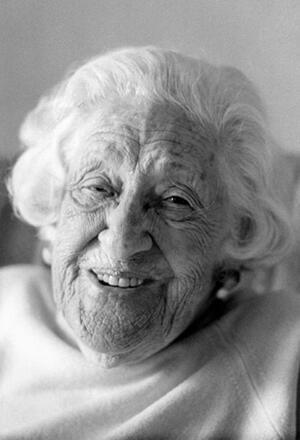Edith Furstenberg
A social worker and homemaker, Edith Furstenberg has dedicated her life to family and the pursuit of social justice. Born in Baltimore in 1910, she was a member of the large Hollander family. Encouraged by her father's liberal views on education, Edith attended Goucher College, traveled alone in Europe as a young woman, and graduated from New York School of Social Work in 1933. Edith worked in the field of child welfare in New York City until her marriage to Dr. Frank Furstenberg in 1934. The couple moved to Baltimore, where they raised a family of six children, Carla, Mark, Frank Jr., Michael, Ellen, and Anne. On several occasions, Edith assumed responsibility for moving their large family when her husband was assigned to medical positions in the Public Health Service during World War II. After a seventeen-year hiatus, she returned to social work, specializing in providing services to children with special needs and their families. An independent and energetic woman, Edith continues to travel and enjoy her large circle of family and friends.
Edith was born in Baltimore in 1910 and grew up in Forest Park. Edith traces her family history; her mother's family is of German descent, her great-grandfather was involved in the Gold Rush, and both of her parents were born in Baltimore. She describes her early influences; her mother and an aunt who was a social worker were both role models. Growing up, Edith noticed there were different expectations for girls and boys. Edit reflects on her Jewish education, her time at Goucher College, where she experienced antisemitism, and her family's changing relationship with their German heritage due to Nazism and the Holocaust. After graduating from Goucher College, traveling in Europe, and earning a degree in social work from the New York School of Social Work, Edith started her career in child welfare in New York City. Ultimately, Edith left this position when she married her husband, Dr. Frank Furstenberg, in 1934 and moved to Baltimore. She looks back on her married life and family life. Edith struggled at first to get pregnant but eventually raised six children in the Jewish culture and with Jewish values. During the Second World War, Edith was lucky that her husband stayed on the Homefront, working in the public health service during the war, and they were able to spend those years together. In 1953, when her youngest was in kindergarten, Edith went back to social work. She remarks that working part-time and having full-time help at home made returning to work possible. Edith also reflects on the national political movements that she lived through, her family's involvement in the Civil Rights Movement, their feelings about antisemitism, segregation, and discrimination, and her admiration for President Franklin D. Roosevelt. Finally, Edith comments on changing attitudes towards marriage and childbirth, the joys and challenges of raising a family, and her career as a social worker.



